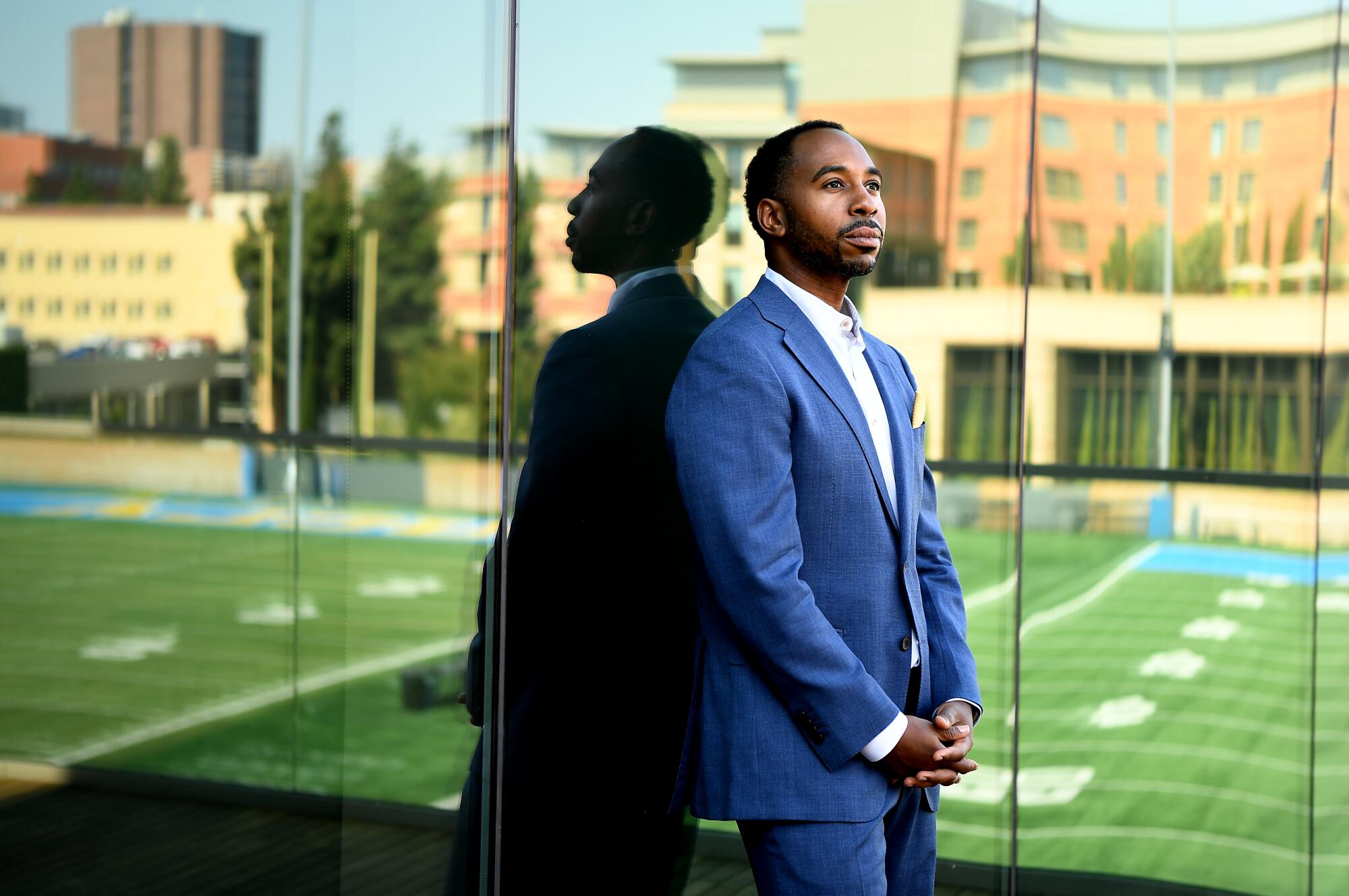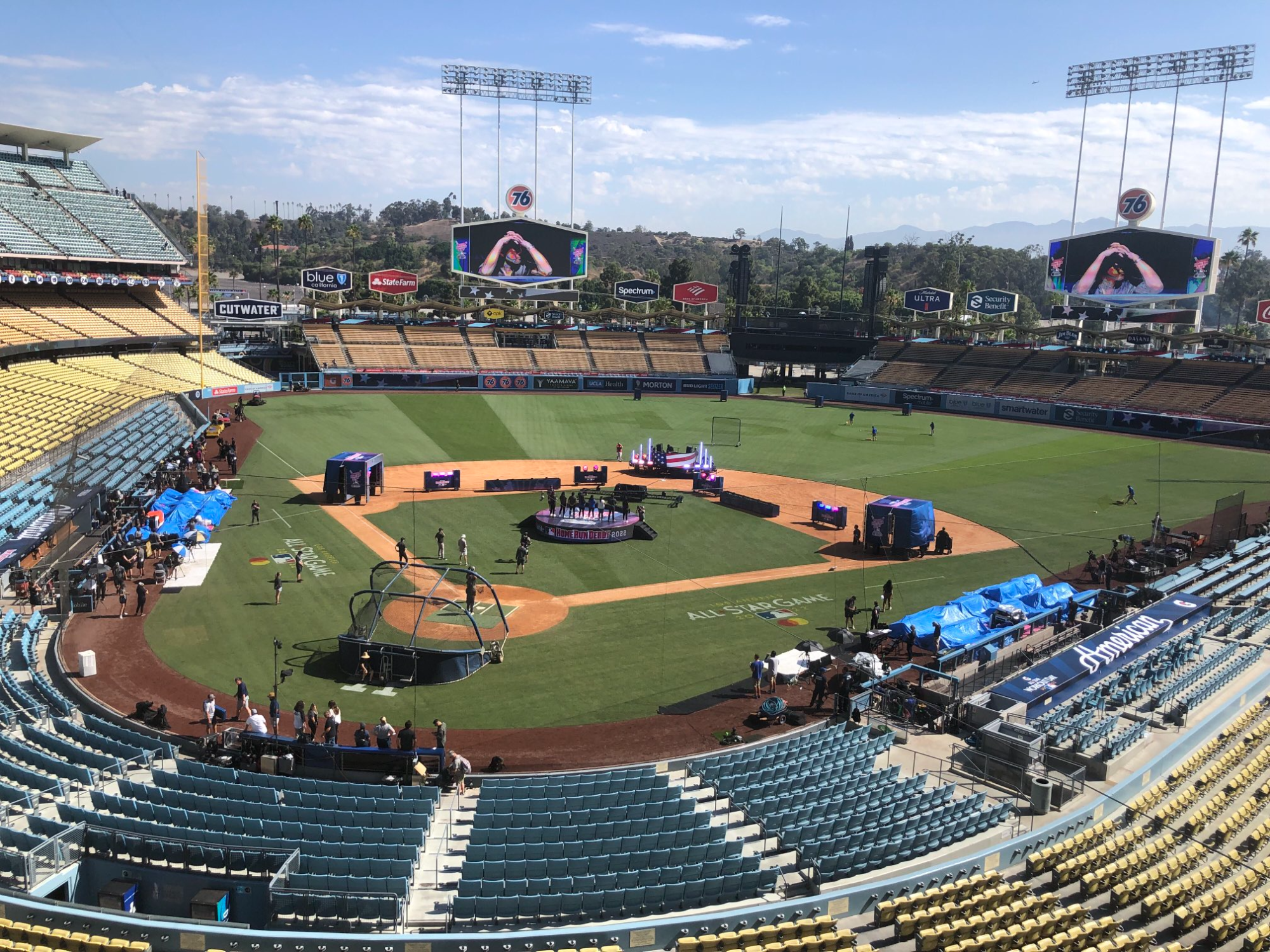UCLA can’t afford to let Martin Jarmond hire its next football coach
Two years ago, reaching the first major crossroads of his UCLA athletic director career, Martin Jarmond drove the Bruins into a ditch.
He should have fired the unhappy and unsuccessful Chip Kelly at the end of the 2023 regular season. He did not. He instead praised Kelly for building a “strong and phenomenal culture.”
Three months later Kelly fired himself with an escape that seemingly everyone but Jarmond saw coming.
Soon thereafter, upon reaching the second major crossroads of his athletic director career, Jarmond drove the program into an even deeper ditch.
Requiring less than 72 hours to replace Kelly, Jarmond did so by hiring a head coach who was preeminently unqualified to be a head coach, a former running back who had never led a team at any level, a reticent former Bruin who had never even called a play.
It took barely a season for that mistake to be formally acknowledged, and now that DeShaun Foster was fired Sunday after winning just five of 15 games, the real issue becomes obvious.
Martin Jarmond has steered this football program into a steaming wreckage, failing to properly manage the most important asset of any modern-day athletic director, turning the Bruins’ largest and most lucrative national presence into a sputtering embarrassment, and you have to wonder.
Now that he has buried them, is Martin Jarmond the right person to dig them out?
It’s difficult to imagine the budget conscious UCLA administrators would spend about $8 million to fire a guy who just last winter was given a five-year contract extension. Then again, they just spent $6.43 million to can Foster less than two years after they hired him.
But something has to happen. Hire a football general manager and let them pick the new coach while Jarmond moves to the background. Or simply pay Jarmond, let him walk, and start from scratch like you should have done two years ago at the end of the Chip Kelly era.
Whatever happens, considering the huge stakes involved, how can Bruins chancellor Julio Frenk allow Jarmond to hire the next football coach?
Jarmond has whiffed on situations involving the last two coaches and you’re going to let him come to the plate again? Risking a third consecutive strikeout? It’s an outcome so humiliating that baseball even has a name for it, terming three strikeouts in one game as earning that player a “silver sombrero.”
Can UCLA really afford to let their athletic director wear that?
Certainly, Jarmond has done some great things with other sports since arriving at UCLA as a relatively untested and unknown administrator five years ago. Last season, when including the Mountain Pacific Sports Federation, Bruin teams won more conference championships than any other Big Ten school.
UCLA athletic director Martin Jarmond has done well in many areas, but football is not one of them.
(Wally Skalij / Los Angeles Times)
A men’s water polo national title. The only school with both baseball and softball teams in the College World Series. Women’s basketball in the Final Four. The list goes on.
Jarmond has done well in many areas. But in today’s collegiate sports environment, a Power Five athletic director basically has one job and one job only.
Don’t fumble football.
Football is the cash cow. Football is the monthly rent. Football drives campus revenue. Football creates national reputation. So many people are ridiculing UCLA football this fall that many have forgotten the Bruins greatness in other sports, and in the name of John Wooden, that’s unacceptable.
Football is just too important to be led by someone who would get embarrassed by consecutive coaches, someone who would allow Chip Kelly to leave before firing him, someone who would then hire DeShaun Foster without qualifications, someone who just doesn’t seem to be in touch with the most vital part of his job.
Jarmond had a chance to take full responsibility for both coaching misfires during a Sunday afternoon conference call with reporters.
He did not.
He basically said that the decision to keep Kelly involved higher authorities and the choice of Foster was due to unusual circumstances.
Regrettably, nowhere in the two explanations were the words, “I just blew it.”
About keeping Kelly when he should have been dumped: “What I’ll remind you is these decisions aren’t made in a vacuum. There are many stakeholders and factors that go into where and when and how to make a coaching change. That said, ultimately, I’m the athletic director. I’m the steward of this program, and the buck stops with me. But I want to reiterate: These kinds of decisions at this level are not made by one person, they’re made by the stakeholders and factors and circumstances that surround that.”
Disagree. When it comes to handling a football coach, no stakeholder’s voice should be stronger than that of the athletic director, or you need a new athletic director.
About hurriedly hiring Foster, he said: “I made the best decision with the circumstances and resources that I had to work with… I’m very confident in my ability to hire coaches that win championships … this search is going to be very different than the last one … when it was after football signing day, and we had to make a change and get that done quickly.”
Absolutely, the hiring of Foster was conducted in a tight timeline. But to make such a giant decision and not even take a week? That bordered on athletic director malpractice. And eventually, we all saw the result.
Actually, few saw the result. One of the reasons Foster was fired so quickly was that the Rose Bowl had become an empty shell of more broken Bruin dreams.
OK, so the good news is that UCLA now has an entire season to find a bright young coach — where is the Sean McVay of college football? He has to be out there! — and they will have the first shot at many good candidates.
The bad news is that Jarmond was talking Sunday about assembling a search committee full of a bunch of so-called experts and former Bruins. That never works. Too many voices drown each other out and you end up with a compromise candidate.
The hire needs to be made by a strong athletic director willing to make a bold hire for which they accept full responsibility and hold themselves completely accountable.
More bad news. Until further notice, that athletic director is Martin Jarmond.

